|
|
|
Sort Order |
|
|
|
Items / Page
|
|
|
|
|
|
|
| Srl | Item |
| 1 |
ID:
107185
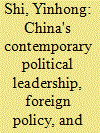

|
|
|
|
|
| Publication |
2011.
|
| Summary/Abstract |
There have been several profound features embedded in the contemporary Chinese political leadership, all having their roots in the Chinese centuries-long traditions or the modern/contemporary creative practice, together with their shaping impacts upon China's foreign policy or remarkable reflections in her external behavior. They are: reforms inherently differentiated; central idea of "maintenance", notion of "biological circle governing universe", paradox in the question of equality, the emphasis on morality, overwhelmingly domestic function of foreign policy, firm belief in the Chineseness per sue and its overwhelming importance, and political prudence in the perennial context of "Strong China, Weak China." China is facing enormous domestic historical challenges and substantial international pressure, while a generally peaceful China can be assured at least from her self-regarding realistic perspective.
|
|
|
|
|
|
|
|
|
|
|
|
|
|
|
|
| 2 |
ID:
107167
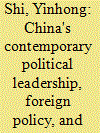

|
|
|
|
|
| Publication |
2011.
|
| Summary/Abstract |
There have been several profound features embedded in the contemporary Chinese political leadership, all having their roots in the Chinese centuries-long traditions or the modern/contemporary creative practice, together with their shaping impacts upon China's foreign policy or remarkable reflections in her external behavior. They are: reforms inherently differentiated; central idea of "maintenance", notion of "biological circle governing universe", paradox in the question of equality, the emphasis on morality, overwhelmingly domestic function of foreign policy, firm belief in the Chineseness per sue and its overwhelming importance, and political prudence in the perennial context of "Strong China, Weak China." China is facing enormous domestic historical challenges and substantial international pressure, while a generally peaceful China can be assured at least from her self-regarding realistic perspective.
|
|
|
|
|
|
|
|
|
|
|
|
|
|
|
|
| 3 |
ID:
107160
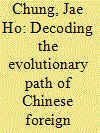

|
|
|
|
|
| Publication |
2011.
|
| Summary/Abstract |
Chinese foreign policy has made a grand transition during the post-Mao reform era. Chinese foreign policy of the 21st century has become much more open and pragmatic in its relations with the outside world, more extensive in its reach and coverage, highly diversified in its functions and partners, more committed to international norms than before, and much more sophisticated in its dealing with the international community. Yet, the precise balance between the changes and continuities is still quite difficult to gauge. Furthermore, despite crucial visible changes, concerns and worries - even some fears - are discernible with regard to the rise of China. In the last 60 years, Beijing has sought hard to sustain consistencies (shizhong ruyi) in its foreign policy. Perhaps, that is the best clue the world has in inferring the future trajectory of Chinese foreign policy.
|
|
|
|
|
|
|
|
|
|
|
|
|
|
|
|
| 4 |
ID:
107177
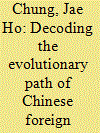

|
|
|
|
|
| Publication |
2011.
|
| Summary/Abstract |
Chinese foreign policy has made a grand transition during the post-Mao reform era. Chinese foreign policy of the 21st century has become much more open and pragmatic in its relations with the outside world, more extensive in its reach and coverage, highly diversified in its functions and partners, more committed to international norms than before, and much more sophisticated in its dealing with the international community. Yet, the precise balance between the changes and continuities is still quite difficult to gauge. Furthermore, despite crucial visible changes, concerns and worries - even some fears - are discernible with regard to the rise of China. In the last 60 years, Beijing has sought hard to sustain consistencies (shizhong ruyi) in its foreign policy. Perhaps, that is the best clue the world has in inferring the future trajectory of Chinese foreign policy.
|
|
|
|
|
|
|
|
|
|
|
|
|
|
|
|
| 5 |
ID:
107180


|
|
|
|
|
| Publication |
2011.
|
| Summary/Abstract |
This paper examines China's role in the Six-Party Talks, a multilateral initiative with the aim of denuclearising North Korea. As North Korea's behaviour has become increasingly provocative, evidenced by the Cheonan and Yeonpyeong Incidents and the newly unveiled uranium enrichment plant at Yeonbyon, China's indecision in dealing with the deteriorating situation has dramatically undermined Beijing's ability to continue successfully to play the leading mediator role. Yet if China fails to take decisive action now, the consequences could be dire. Further deterioration in North Korea's behaviour could trigger a nuclear arms race, severely hamper regional economic development and even create a geopolitical split in East Asia, leading to a confrontation between the US, South Korea and Japan acting together on one side, and China, Russia and North Korea aligned on the other. The factors that have prevented China from making further progress in the diplomatic process are many and various and this paper will reveal the complexity of the North Korean issue for China. Foreign academics and policy makers have tended to attribute China's indecision over North Korea to China putting its own security interests first. But this is far too simplistic a picture of the complex relationship that China has with North Korea. There are a host of factors at work that need to be taken into account to understand the present impasse in the diplomatic process. These factors include China's emotional ties to North Korea and empathy with its position as the weakest party in the Talks, the conflicting attitudes within the Chinese government itself towards the North, and the competing interests and lack of trust between the different stakeholders. It seems that for the foreseeable future, the North Korean issue will continue to plague Chinese foreign policy until all the parties involved act as a collaborative body to reach a consensus on how to resolve the situation.
|
|
|
|
|
|
|
|
|
|
|
|
|
|
|
|
| 6 |
ID:
107162
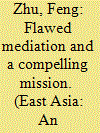

|
|
|
|
|
| Publication |
2011.
|
| Summary/Abstract |
This paper examines China's role in the Six-Party Talks, a multilateral initiative with the aim of denuclearising North Korea. As North Korea's behaviour has become increasingly provocative, evidenced by the Cheonan and Yeonpyeong Incidents and the newly unveiled uranium enrichment plant at Yeonbyon, China's indecision in dealing with the deteriorating situation has dramatically undermined Beijing's ability to continue successfully to play the leading mediator role. Yet if China fails to take decisive action now, the consequences could be dire. Further deterioration in North Korea's behaviour could trigger a nuclear arms race, severely hamper regional economic development and even create a geopolitical split in East Asia, leading to a confrontation between the US, South Korea and Japan acting together on one side, and China, Russia and North Korea aligned on the other. The factors that have prevented China from making further progress in the diplomatic process are many and various and this paper will reveal the complexity of the North Korean issue for China. Foreign academics and policy makers have tended to attribute China's indecision over North Korea to China putting its own security interests first. But this is far too simplistic a picture of the complex relationship that China has with North Korea. There are a host of factors at work that need to be taken into account to understand the present impasse in the diplomatic process. These factors include China's emotional ties to North Korea and empathy with its position as the weakest party in the Talks, the conflicting attitudes within the Chinese government itself towards the North, and the competing interests and lack of trust between the different stakeholders. It seems that for the foreseeable future, the North Korean issue will continue to plague Chinese foreign policy until all the parties involved act as a collaborative body to reach a consensus on how to resolve the situation.
|
|
|
|
|
|
|
|
|
|
|
|
|
|
|
|
| 7 |
ID:
107163
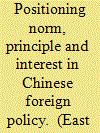

|
|
|
|
|
| Publication |
2011.
|
| Summary/Abstract |
There are different driving forces behind Chinese foreign policy decision-making. Norms, principles, and interests and the subtle combinations of them, I argue in this paper, are the major driving forces on the input side, while the domestic situation of a specific country and international pressure undercut China's policy deliberations. By contrast, the form of government of a specific country under discussion is not an important variable. In this paper, I use China's policy toward Myanmar as a case study. The findings prove that the integration of norms, principle and practical interests has formed the powerful impetus that drives China's policies toward Myanmar. Among these factors, the interests China has identified in general and stability on its "doorstep" in particular play a dominant role, while the norm of human security and the principle of non-interference are embedded in its policy deliberations.
|
|
|
|
|
|
|
|
|
|
|
|
|
|
|
|
| 8 |
ID:
107181


|
|
|
|
|
| Publication |
2011.
|
| Summary/Abstract |
There are different driving forces behind Chinese foreign policy decision-making. Norms, principles, and interests and the subtle combinations of them, I argue in this paper, are the major driving forces on the input side, while the domestic situation of a specific country and international pressure undercut China's policy deliberations. By contrast, the form of government of a specific country under discussion is not an important variable. In this paper, I use China's policy toward Myanmar as a case study. The findings prove that the integration of norms, principle and practical interests has formed the powerful impetus that drives China's policies toward Myanmar. Among these factors, the interests China has identified in general and stability on its "doorstep" in particular play a dominant role, while the norm of human security and the principle of non-interference are embedded in its policy deliberations.
|
|
|
|
|
|
|
|
|
|
|
|
|
|
|
|
| 9 |
ID:
107183


|
|
|
|
|
| Publication |
2011.
|
| Summary/Abstract |
Normative changes in the Western-dominated international society have been taking place, symbolized by the evolution from the "standard of civilization" to the "new standard of civilization". And the West has always been the developer of the new norms in international society, and changes in international norms reflect the link between power on one hand and norms, rules and institutions on the other. That is a fact or an invented reality which a rapidly rising China has to deal with, and its implications on China's future relationship with the international society are sure to be great and far-reaching.
|
|
|
|
|
|
|
|
|
|
|
|
|
|
|
|
| 10 |
ID:
107165


|
|
|
|
|
| Publication |
2011.
|
| Summary/Abstract |
Normative changes in the Western-dominated international society have been taking place, symbolized by the evolution from the "standard of civilization" to the "new standard of civilization". And the West has always been the developer of the new norms in international society, and changes in international norms reflect the link between power on one hand and norms, rules and institutions on the other. That is a fact or an invented reality which a rapidly rising China has to deal with, and its implications on China's future relationship with the international society are sure to be great and far-reaching.
|
|
|
|
|
|
|
|
|
|
|
|
|
|
|
|
| 11 |
ID:
107176
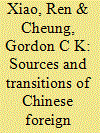

|
|
|
|
|
| Publication |
2011.
|
| Summary/Abstract |
Chinese foreign policy has multiple sources, and the incentives that are driving its behaviour have grown from the domestic/international, as well as from regional, economic, normative, multilateral, and cultural levels. Foreign policy-making in China is becoming increasingly complex and sophisticated. This special issue is drawn from some edited papers presented in the joint workshop between Fudan and Durham Universities on Chinese foreign policy on 29-30 March 2010. By assessing the economic, domestic, regional, global and cultural sources of Chinese foreign policy, we aim to illustrate the various sources and to locate possible ways to consolidate the transitional process, and to spur future endeavour facing China's foreign policy.
|
|
|
|
|
|
|
|
|
|
|
|
|
|
|
|
|
|
|
|
|